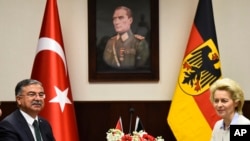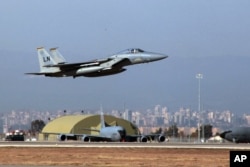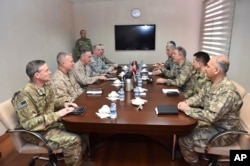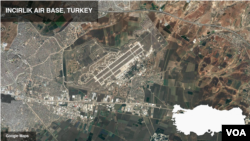Attention is growing on Turkey's relationship with key NATO allies because of an increasingly acrimonious fight over the use of its Incirlik airbase.
Ankara and Berlin remain at loggerheads over German lawmakers being blocked from visiting their soldiers operating at the base.
“It's a legitimate right from the German point of view and that is something Ankara is missing,” points out former Turkish ambassador Unal Cevikoz, now president of the Ankara Policy Center, research organization. “I understand at the meeting in Brussels between Chancellor [Angela] Merkel and President [Recep Tayyip] Erdogan [in May] the matter was seriously discussed.”
The blocking of German lawmakers to Incirlik follows Berlin's refusal to extradite to Turkey suspects in July's coup attempt. Bilateral tensions soared this month with Germany granting asylum to more than 200 Turkish diplomats and military personal wanted by Turkish authorities. The two sides are in talks to resolve the impasse.
“I have seen some hints that Turkey will be looking at this issue favorably,” predicts former Turkish ambassador Cevikoz.
'Blackmail’ won’t work
Germany has deployed reconnaissance planes to Incirlik as part of international efforts against Islamic State. The vast base, located close to the Syrian and Iraqi borders, is widely seen as crucial in the war against the jihadists. But this month German Foreign Minister Sigma Gabriel warned Berlin is prepared to relocate its forces. Jordan is widely touted as an alternative.
“It's not if, but when, and that ‘when’ will happen quite soon," warns former senior Turkish diplomat Aydin Selcen, who served widely across the region and is now an analyst.
“It's up to them, we will not beg them (to stay),” Turkish Foreign Minister Mevlut Cavusoglu said, claiming Berlin's threat to withdraw is “blackmail.”
Key logistics hub
Repercussions from the German-Turkish dispute could add to growing unease in Washington. U.S. forces are the primary foreign users of Incirlik in its war against the Islamic State, as well as using it as a key logistics hub.
But Ankara has tried to use that dependency as leverage in its dispute with Washington over its military support of the Syrian Kurdish militia the YPG in fighting Islamic State. Ankara calls the YPG terrorists, claiming they are affiliated with the PKK, which is fighting the Turkish state.
“There is high anti-Americanism in Turkey,” observes Sinan Ulgen, a visiting scholar at the Carnegie Institute in Europe. “There has been talk of restricting use of Incirlik, other than Incirlik there are few areas that Ankara could really undermine the U.S. position.”
“The refusal of Turkey's suggestion to avoid using the PKK/PYD/YPG in the Raqqa operation is unacceptable hypocrisy,” thundered Devlet Bahceli, leader of the National Action Party, in parliament Tuesday. Bahceli is a key backer of Erdogan, who has an eye on his 2019 presidential re-election bid.
A balancing act
Ankara's use of Incirlik as leverage on its allies, in particular Washington, analysts claim is a balancing act, extracting maximum concessions, but avoiding a withdrawal.
"I don't think Turkish policy makers want to go there really, [to U.S. withdrawal],” claims analyst Ulgen. But the dispute with Berlin over Incirlik's use, could add impetus in Washington to reassess its own dependency.
“The [U.S.] movements of planes from Incirlik are now reduced to earlier periods. This sends a strong signal to Ankara, that Incirlik is not indispensable,” warns former diplomat Aydin. “But lets not forget there are some quarters in Ankara, whether among officials or politicians, who will rejoice if that day comes and the U.S. decides to move out of Incirlik all together.”
Not just a military airbase
The cost to Ankara of its allies abandoning Incirlik could be immediate and considerable.
“Incirlik is not just a military airbase used by our allies, its also important for intelligence purposes,” points out research organization head Cevikoz. “The intelligence German and U.S. experts secure are also shared with Turkey and this intelligence is absolutely necessary for Turkey's fighting against the PKK terrorism.”
Turkish policy makers comfort themselves in knowing that finding an alternative to Incirlik has proved illusive to the United States. Analysts point out no one base can match Incirlik, but a combination of airbases belonging to the semi-autonomous Iraqi Kurdistan Regional Government, along with small airstrips in Syria controlled by the YPG, could offer an alternative.
Such a step could have far reaching consequences.
“It will underline the fact Turkey is not a strategic partner anymore for the other members of the coalition,” warns analyst Aydin. “But looking at the map, the geographical size of Turkey and its location, Turkey will still remain indispensable in the fight against ISIS.”







